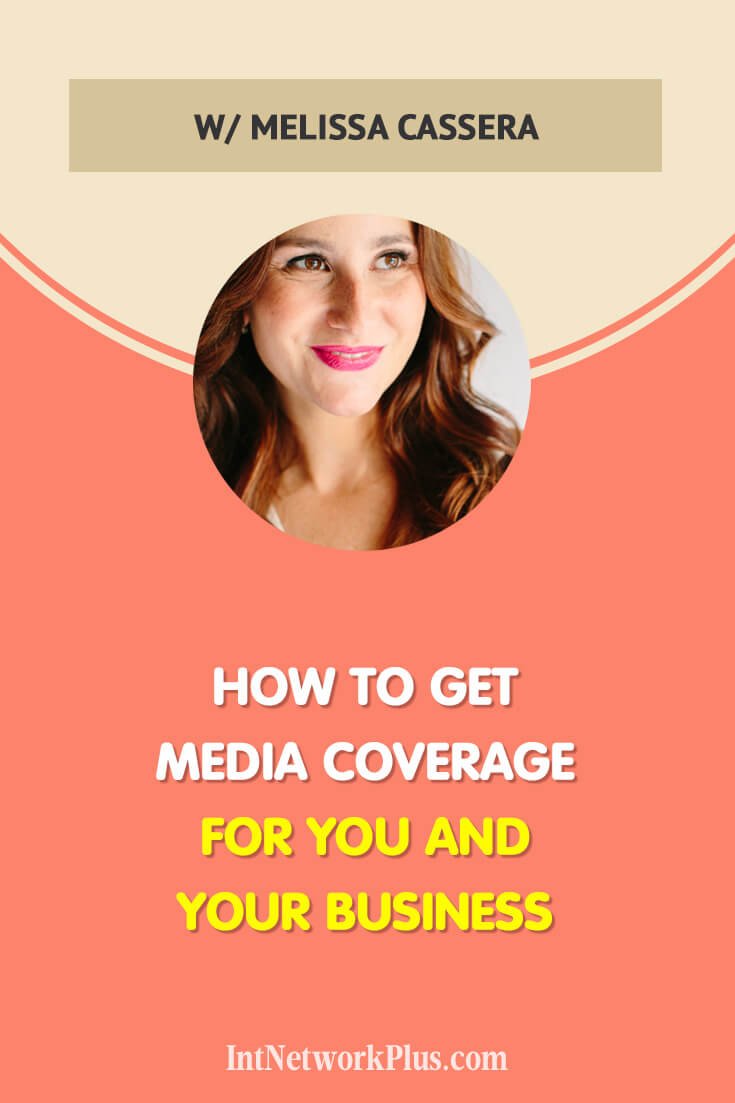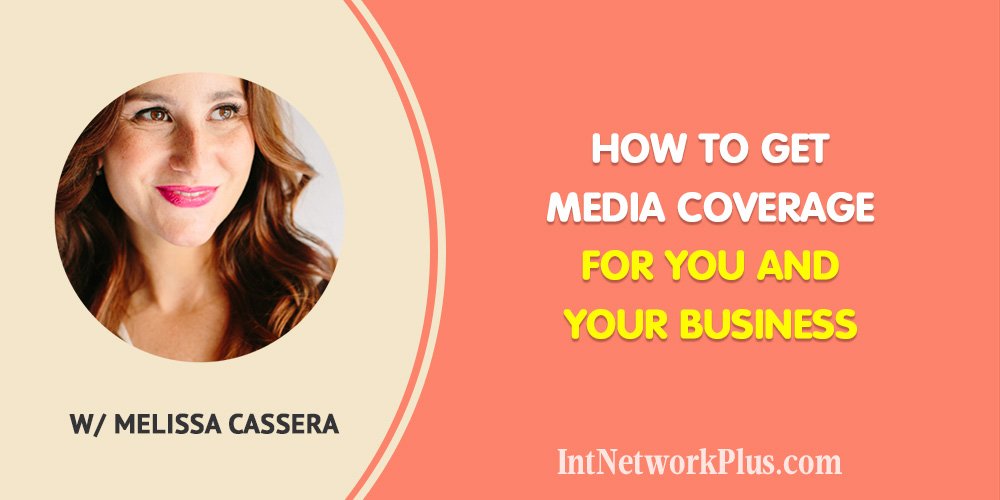Getting the online and offline media coverage can grow your brand tremendously. Media coverage on the smaller publications may help to increase your audience while the more significant media will give you authority and credibility.
In this episode, Melissa Cassera shares how to get media coverage for you and your business.
Melissa is a Los Angeles – based screenwriter and award-winning marketing consultant.
She was named one of the nation’s “Top Personal Branding Experts” by The Huffington Post, and her insights have been featured on NBC, ABC, CBS, and Fox News as well as in Glamour, Redbook, Fast Company, and Forbes.
In this episode, we will cover:
- [00:22] About the episode and Melissa Cassera
- [01:33] Melissa’s journey from a PR in pharmaceuticals, to helping small business owners with marketing, to a screenwriter in LA
- [02:50] Where to begin in regards to media coverage
- [02:56] Find out what are the stories within your business and brand
- [04:39] Identify who would be an appropriate outlet for you
- [05:47] Difference between online and offline media
- [06:23] How being featured with known media outlets give credibility to your brand
- [07:42] What you should expect in regards to direct traffic from media coverage
- [08:53] A significant advantage of online press
- [10:10] Why Melissa recommends a combination of media types
- [12:16] How to get into contact with a media outlet
- [14:48] Mistakes to avoid when pitching and making contact with media outlets in such a competitive industry
- [16:48] What to do if the media publication doesn’t respond and how to write an engaging follow-up email
- [18:32] The two types of no and what to do about them
- [20:31] How to make sure this strategy is right for you
- [23:06] How to use your media coverage to your advantage regarding credibility and popularity
- [24:01] How to use hyperlinks in a creative way
- [25:43] Melissa’s top tip when starting this strategy: do your research
- [26:52] Why a PR strategy with media relations takes a longer time to establish and initiate
- [29:22] Where to find Melissa on the Internet
- [29:44] And especially for coffee lovers 🙂
- [30:21] For the show notes go to test.marinabarayeva.com and subscribe to the Marketing for Creatives show
3 Things to Plan to Get Media Coverage for You and Your Business
- How can you reach them through that?
- Where your message would be most appropriate?
- Where is your ideal audience showing up?
Pin these quotes to your Pinterest board:
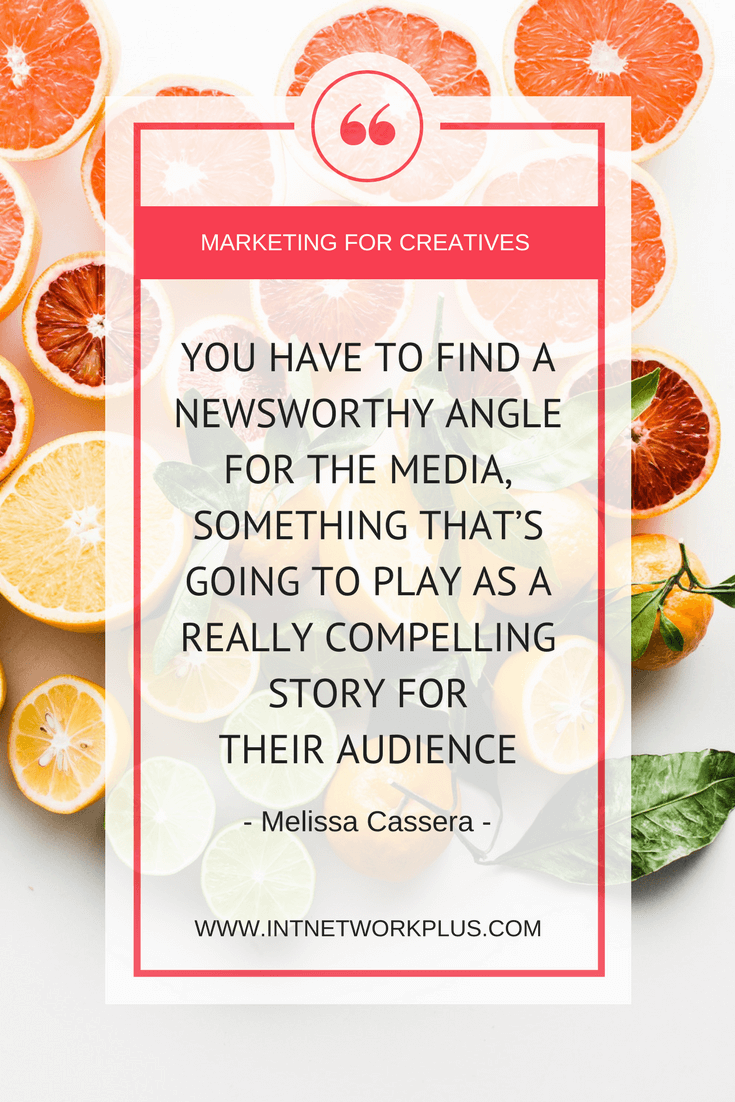
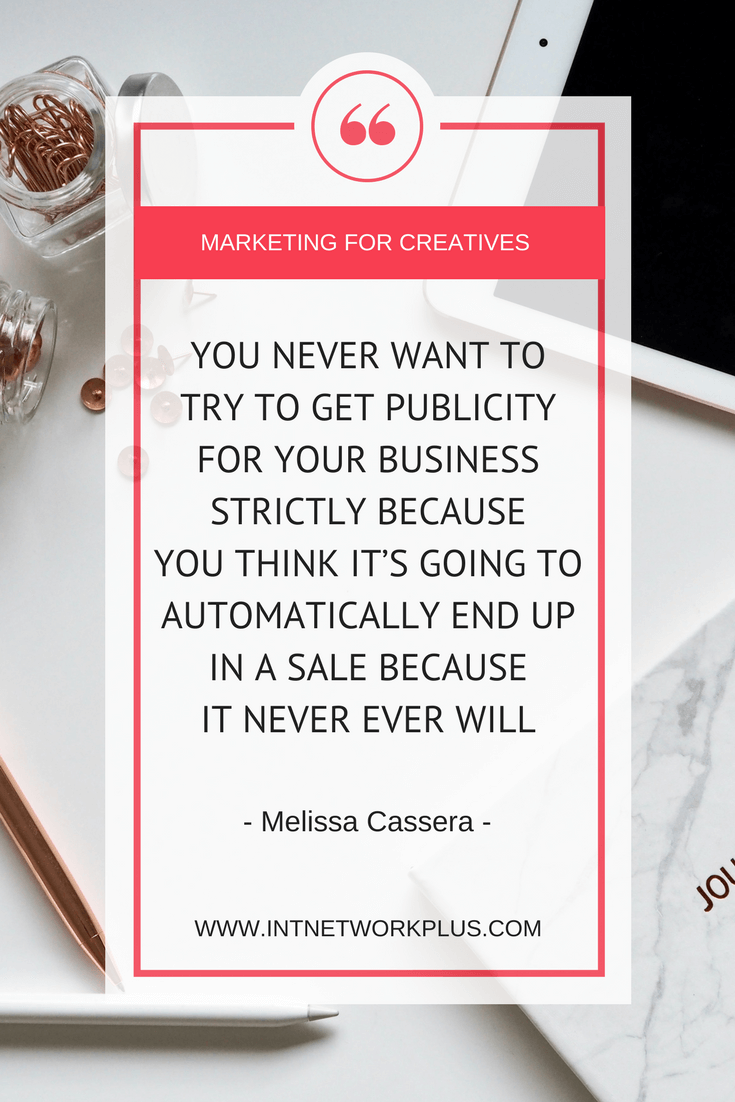
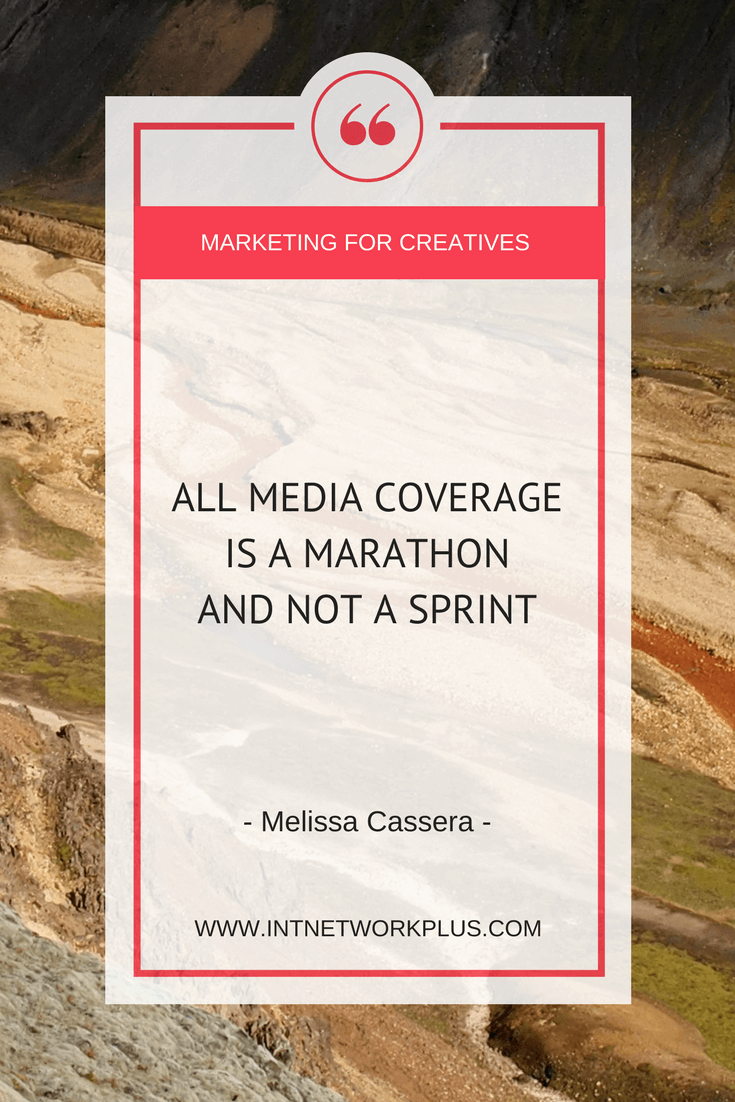
Resources from this interview:
- Learn more about Melissa Cassera on melissacassera.com
- Follow Melissa on Instagram
How to Get Media Coverage for You and Your Business – Interview Transcription
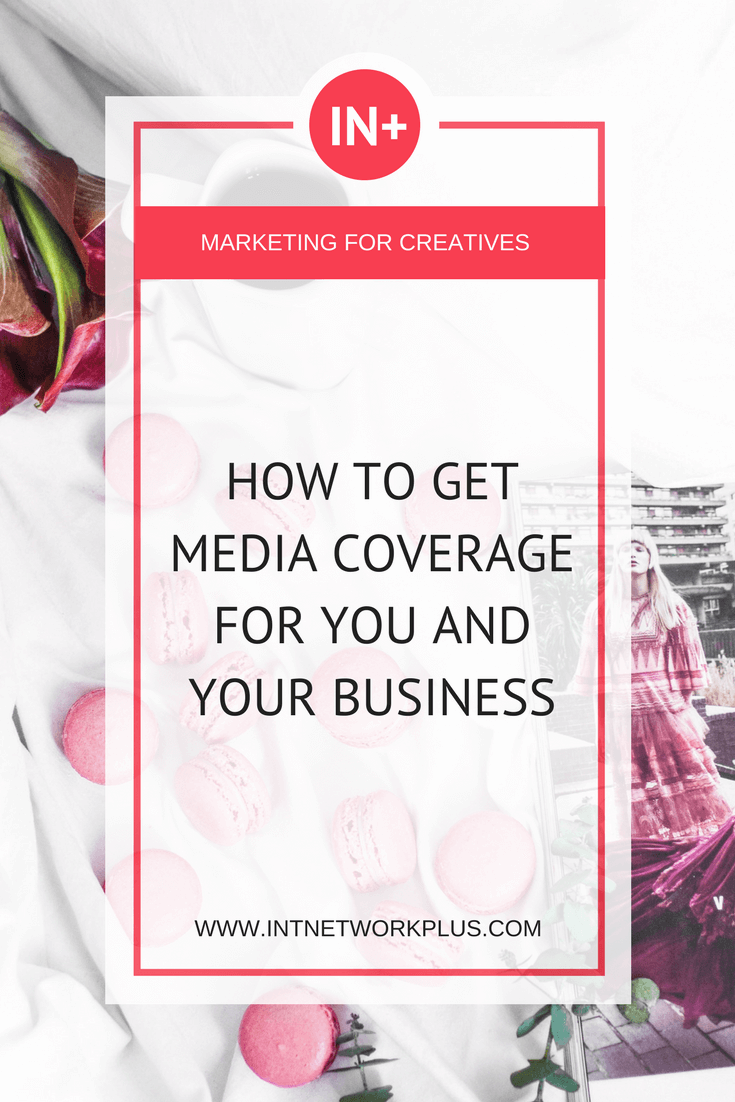
Marina Barayeva:
Melissa, please tell us about yourself. Tell us your story.
Melissa Cassera:
Sure. I have been in marketing and PR for about 15 years now, so a very long time. I started out doing PR in pharmaceuticals and then moved into book publicity and then moved into working with small business owners and creatives, much like your wonderful audience.
Then a few years ago I decided to open another division of my business and work as a professional screenwriter. So I’m not only helping entrepreneurs tell their stories, I’m telling my own fictional stories now as well, which is super fun.
I live here in Los Angeles and make movies and TV shows in addition to lots of fun marketing work for small business owners.
Marina Barayeva:
Wow. That’s a lot of stuff, so many interesting things. You’re creative as well and you do marketing stuff too.
Melissa Cassera:
Absolutely.
Marina Barayeva:
If we want to get media coverage, that’s what you work with, what should we start with there?
Melissa Cassera:
There are actually a few things to start with when it comes to media coverage. The first thing is pulling out what the stories are within your business and your brand. The media never wants to cover, “Look at this business owner and look at her latest product,” or, “Look at her latest service,” because that’s essentially what advertising is.
You have to find a newsworthy angle for the media, something that’s going to play as a really compelling story for their audience.

There are lots of ways to do that. It could be anything from your origin story. If it’s for a business profile where they do have a section in their magazine or website or podcast where you have the ability to tell your story, that can be a good angle in.
But a lot of places or outlets don’t have that opportunity, so if that’s the case, you want to look at how can you serve as an advisor for their audience. Can you give them five ways to do something specific that aligns with your industry? Or do you have a controversial or different viewpoint on something that they talk about quite often?
An example would be like if you are a health coach or someone that works in the nutrition and health industry, you probably have a very strong opinion on losing weight or body image, or things like that. You could present your viewpoint on that.
First you want to really think about what are the stories you can tell that will be compelling enough that the media is going to say, “Yes, we absolutely want to feature you.” That’s definitely the biggest consideration.
The second thing is just identifying who would be the appropriate outlets for you. Just because we all want to be featured, let’s say, on Oprah’s SuperSoul Sunday doesn’t mean that’s necessarily the right outlet for us and our message.
It’s really about identifying:
- Where your message would be most appropriate?
- Where is your ideal audience showing up?
- How can you reach them through that?
That takes some significant research to uncover those places, but once you do the research, then it becomes much easier after that because you’ll have a nice curated list of places that you can reach out to.
Marina Barayeva:
There is a lot of media out there. What do you think is more effective for entrepreneurs, online or offline media coverage?
Because now people say that offline media is dying and online is too competitive, too much stuff gets out online, so which one is better?
Melissa Cassera:
They serve different purposes, and nowadays the lines are bleeding a little bit because…
It used to be that offline media was more highly regarded than online media but now that’s shifting. It really just serves two different purposes.
If it’s a big nationally or internationally known media outlet, like Oprah’s SuperSoul Sunday or The New York Times or a national glossy magazine like Glamour or O Magazine, something like that, obviously those are going to lend themselves really well to adding credibility to your business because there’s not a lot of real estate in those places, meaning that a magazine only publishes 10 to 12 issues a year.
So if they’ve selected you to do a story on or to even just use your advice, that looks really good. And plus, most people recognize those national or international media outlets, so you can use them for credibility indicators.
You could have on your website that you’ve been featured in these places and put the logos there.
Wherever people are making a buying decision on your website, like a sales page or product description, you might say something there like, “As featured in blah blah blah,” wherever you’ve been featured.
They can work really well there to help your consumers decide to buy from you. Because if they’re on the fence but then they see that you’ve been featured in O Magazine and you’ve been on The Today Show or wherever it’s been and people recognize that, then they might say, “This person obviously knows what they’re doing. They’re a good match for me because if those outlets have featured them, then maybe this is something I should check out as well.”
But the only downside with those outlets is that they rarely bring direct traffic to you and your business. Press isn’t really intended to do that anyway. There’s not a direct line from getting a piece of press to getting a sale. There are many things that happen in between that that could either make or break a sale.
You never want to try to get publicity for your business strictly because you think it’s going to automatically end up in a sale because it never ever will. It can help you get a sale but it’s never going to be that direct line.

Back to what I was saying about the more widely recognized media outlets. They can be great, as I said, for credibility indicators but they’re not so great for driving a bunch of traffic. The reason is because if you read about someone in a physical magazine, you’re holding a glossy magazine, it’s very rare that you’re then going to go on your computer and Google them and look them up or plug in their website.
It’s pretty rare because you’re just not in that medium at the moment. You’re not on your computer; you’re reading a magazine on a plane or wherever you are, on the beach, on your coach.
So when you get online press, the good thing about that is it usually links right to your website. The nice thing about doing guest blogs or just being featured on the online components of offline media or being featured on podcasts to some extent if there are show notes where they’re linking out to you, that can be really good.
You will find with online press that it could drive more traffic than offline press, though again that doesn’t necessarily mean that that traffic is going to result in a sale, it just means that the likelihood of more people coming and visiting your brand is higher simply because for them to click the highlighted URL to get to you is much easier than them consuming some piece of offline media.
Marina Barayeva:
You talk about different options we can have. What kind of media coverage can people get and which one do you think is better for business like guest posts, interviews about business, reviews or something else?
Melissa Cassera:
I like a combination personally. I don’t think that anyone should completely cut out a specific type of media.
However, nowadays what I find is really powerful is any type of media that takes a lengthier lime for people to consume because the commitment level is longer. What I mean by that is if you are on a podcast, let’s say, much as I am on this podcast right now.
People that are listening to a podcast, and listening to my interview, or your interview, or anybody else’s interview on a podcast are typically engaging with that podcast or listening for at least a half an hour. Most podcasts run between 30 and 60 minutes for an interview.
If they’ve invested all of that time with you to listen for that long, the chances that they are actually going to come and engage with your brand afterwards are much higher than if they’ve, let’s say, read an article online and you were featured in that article, and it took them two to three minutes to read that article.
There’s not much investment there, it’s more skimming. They probably skimmed through it. They saw your name, maybe your name didn’t even register to them and they’re like, “Oh, this is kind of a cool article. Okay, I’m done.” Then you click away.
Again, I really wouldn’t cut out any type of media but I do think that nowadays for business specifically, it’s really nice when you can work with something like a podcast or anything that gives you a longer– Or even be a part of a magazine article that’s maybe a feature story that’s a longer six pages spread or something like that where people have to invest more time into you, listening to you, reading about you and your story. That gives it a greater likelihood that they’ll come back and engage with your brand after.
Marina Barayeva:
The more time people spend with your content or engaging with your content, they’re more likely to get to your website, they will check your business, they will probably buy something from you, right?
Melissa Cassera:
That’s right.
Marina Barayeva:
How do you reach out to those types of media outlets and publications? What person should we look for to get in touch with and what should we send them?
Melissa Cassera:
As far as outreach, that can be tricky simply because every single outlet has its own way that they prefer to engage and this would end up being a four-year podcast for us to rattle through each one (laughter).
What I would do is always go on the outlet’s website because many times they will have some information that either says contributor guidelines or there’ll be a contact page that has information like if you want to be a guest or you want to pitch an idea.
Most of the time nowadays the information is on the website and it is different for every outlet. Sometimes, for example, for guest posting they may want you to send the full article for their review but sometimes they just want you to pitch an idea. Again, that’s not something that I personally would know but you would find out directly from the outlet.
Always check their website and then if it’s not available on the website, and the only time it’s not is usually when it’s a national magazine or a television show where it’s done or operated offline.
Most of the time though you can find some information online, but if you absolutely can’t you can always call the front desk reception and say that you have a story idea you would like to send and let them know what it is specifically for.
Don’t tell them the story idea, they don’t need to know that, the receptionist doesn’t care about that, but just let them know. Don’t just say, “I have a story idea for Oprah Magazine.” You need to say, “I have a story idea for this section of Oprah Magazine.” Part of your research is really drilling down where is your story going to slot into their outlet.
If you say, “I have this story idea that would fit great for the Live Your Best Life section of Oprah Magazine. Can you connect me to the editor that handles that?” Then they’ll most likely send you to their voicemail so you’re connecting with the appropriate editor.
At that point, you can leave them a voicemail but you’ll also get their name and you could probably Google their name to find out what their email is and send them a follow-up email as well.
Marina Barayeva:
When people pitch to different media outlets, what mistakes do they make when they write them or they reach out or they send them the content?
Melissa Cassera:
You definitely don’t want to send the same pitch to more than one media outlet. It should always be very customized. You are competing with hundreds if not thousands of other people that are trying to get coverage, so if yours looks like a blanket spam email that’s been sent to seven other editors, it’s just going to immediately get deleted.
Think about that. Every day that editor has to open up their inbox and they’re seeing so many pitches, 300 to 500 pitches, so how is your going to stand out? If it looks like it’s been sent everywhere else, then they’re going to immediately delete it. That’s not interesting.
But if it’s very personalized, if you address them by name, you say that you’re a fan of their outlet, you bring up a recent article they did or a recent podcast episode or a recent whatever, TV segment depending on who you’re pitching. Bring something up like, “I really loved this episode of your podcast, blah blah blah. The reason I loved it is this.” Give them a sentence.
Then say, “I have some thoughts on that topic as well and I thought maybe given that you’re interested in that topic, you might want to hear, your listeners might want to hear, something that gives a new spin on it.” Or, “You mentioned in this podcast this but then you guys went in a different direction. I’m wondering if you’d want a deeper dive into this, and here’s my idea for that.”
It needs to be super personal and you have to tell them exactly how your story is going to fit in to there and that’s going to really dramatically increase your chances of getting coverage.
Marina Barayeva:
If you send them your email, you send them your pitch and they didn’t reply to you or they told you, “No, we’re not interested,” or maybe, “Not right now,” what would you do?
Melissa Cassera:
If they don’t reply, I personally follow up two or three times because sometimes…
It’s pretty rare actually unless it’s a smaller outlet. If it’s an outlet with a smaller audience, then you probably will hear back but if it’s a really big outlet like Oprah Magazine, the chances of you hearing back on the first pitch are pretty much zero. They don’t even get back to publicists that they work with all the time that quickly. You usually want to follow up.
I usually do two or three follow ups depending and in each follow up you want to tell them something different. You don’t want to say, “Hey, did you get my email?” No, they didn’t or they did and it wasn’t that interesting so they ignored it.
When you’re following up, you always want to mention something else in there as to why your idea or pitch would work for them right now. You always want to address that, what’s the right now, what’s the urgency in it? If it’s just something that could be featured anytime, then the chances are they’re not jumping at the bit to do it right that second.
But if there’s some timely element to it, then that’s really cool. Maybe there’s a recent statistic or a recent news story that this could align with or something that happened in pop culture or something that’s tied into a holiday.
Try to think about, when you’re following up, what’s the right now of this? Why should they feature this story right now? Those can be good things. You just want to give them a couple of sentences when you’re following up and just say that, but definitely follow up.
If you do get a no, which is really common of course… In any highly competitive situation, obviously NOs happen. But that’s okay because you still made a connection.
A no could look one of two ways. It could just be no where it’s a complete blow off as in, “No, this isn’t right at all for our audience.” And if that’s the case… I don’t think it will be if you’re really doing your research and customizing your pitches. You probably won’t get that kind of no but for some reason somewhere down the line you had messed up and it does end up that way, that’s okay. That, I would just let go.
But if it’s a pitch that’s really good but just doesn’t work for them then, what they’ll send you is, “I’m going to pass on this but if you have any other ideas, send them to me.” That opens the door.
What I always like to do is anytime I pitch anyone I like to have a running list of ideas so that when you do get that email back that says, “I’m going to pass on this idea but if you have others, let me know,” then you have two or three back-up ideas ready to go so that you’re not like, “Oh no! I have to scramble and come up with something right away.” It’s all ready to go.
You can keep a pitch document of ideas, a big Word document or Google Doc, or whatever you like to use to corral all your ideas together. It’s a good idea to have that ready to go.
Marina Barayeva:
When you say to follow up with people and give them a reason why they should publish it now, for some people it can be hard to come up with an idea why because it’s like, “I want to get published. I want to get some promotion for my business.”
Can you give us some suggestions for what we can write in the follow-up email if we do not have deadlines or any limitations to why we should get published right now?
Melissa Cassera:
I would say if your only reason for bringing PR into your business is just like, “I want to get published,” then I’d say don’t do PR. That shouldn’t be your strategy. Pick another strategy because PR is so much about storytelling and really caring about that story that you’re telling and being so passionate and heated around it and really wanting to reach that audience and help them.
If that’s not in your wheelhouse right now, that’s not how you’re feeling, I’d say this is not the strategy for you. Because the WHY should be really easy. No publicist or outside person can really tell you what that WHY is. Your WHY is inherent. If you’re not feeling that, then I would say don’t use this strategy.
If you are feeling it then the WHY would come to you easily because you’re going to be so passionate about sharing that particular topic, that coming up with a why you’re so passionate to share it is going to be super easy. You’ll be bursting at the seams to want to talk about whatever you’re pitching.
If you don’t have that feeling at all in your business, then number one, don’t use PR as your strategy. There are many other strategies you can use in your business. You don’t have to have a PR strategy.
The second thing I would say is that can also help you to whittle down who you are pitching. Keep your list small. Don’t have this list of hundreds and hundreds of people because if you’re not feeling passionate and you can’t think of a WHY, let’s say why you want Oprah Magazine to run your story besides I just want the fame of being in Oprah Magazine, then they’re going to feel that too.
They need you to tell them why and it can’t just be because I want fame, because I want to promote my business. They don’t care about that. They care about how are you going to help their audience, why are you so passionate about this story or this message.
That all should be really inherent within you even before you consider doing PR for your business.
Marina Barayeva:
When you get the media coverage, let’s say you pitch to them, they accepted you and then in a certain time they’ll publish it and you’ve got this media coverage, how do you use it to grow your credibility and popularity? Even if you have your mission, your big story, do you have any tips on how to use it later for promoting yourself more?
Melissa Cassera:
I think I touched on this a bit earlier as well. You definitely want to highlight or stack your most impressive media coverage and by impressive, I mean who your ideal clients, whoever you’re trying to reach, which media outlets would they recognize most.
The most recognizable ones you’d want to stack on your website. You would probably want to mention them on your about page. You could even make a press page or a news page where you feature all of your most awesome media coverage.
You could take pull-quotes if appropriate. I’ve had some hosts or magazine editors or writers say some really nice things about me and I’ll grab those pull-quotes and use them in my sales pages or product description. There are lots of ways that you can infuse that.
For certain media that maybe you have a little bit more control, and what I mean by that is a lot of times if you’re guest posting for a website or even sometimes when you’re a guest on a podcast, the host and/or the website owner may allow you to provide them with a little description of yourself and a link, whatever link that is, that you want people to come and visit.
That provides you an opportunity to maybe build your community or your list because instead of just giving them a link to your main website, you could then give them a link to something specific.
Maybe there’s a downloaders opt in or a gift that you’ve created where you can give them a very specific link to that landing page and they can come and get this free gift that you’ve created that aligns with whatever guest post your wrote or aligns with your podcast interview.
It doesn’t always work out that way because, again, when you’re guesting for someone else, you don’t have the control over the end result. But in some cases, you will find that there is that kind of opportunity and that’s a fun time that you can take advantage and give a little custom link where people can opt into and at that point it might help you grow your community or list.
Marina Barayeva:
Those are interesting tips. What else do we need to know if we want to get media coverage? Is there anything I missed and you can share with us?
Melissa Cassera:
I think you were super thorough (laughter) of everything that I can think of. I would just reiterate the beginning process of this and really doing your research, really doing good research. A good way to do that as well is looking around, starting with things that you like.
Start with podcasts and websites and magazines, things that you like already because you’ll be more likely to get featured there simply because you have a personal connection to it because you’re already a fan. That’s always a great place to start.
From there you can start to expand out of course and look for and search for other places but starting with what you’re already passionate about and a fan of can be a fun way to go.
Marina Barayeva:
That’s great. Melissa, if you would put that into a strategy for our audience, what are the three steps our listeners could begin with to get media coverage accepted or published within the next two weeks.
Melissa Cassera:
Well, I’m going to have bad news for you.
Marina Barayeva:
Oh no.
Melissa Cassera:
Unfortunately, all media coverage is a marathon and not a sprint. There really isn’t a way to hack your way to press coverage. When you’re relying on someone else to make the final decision, you can’t put those kinds of restrictions. I would really caution anyone from doing that.

Being a publicist myself for many years, we would not even work with a client on less than a six-month contract so that just goes to show you how much time investment you need to put in before you even see any type of result.
When you’re considering this for your business, and again, you don’t have to have a PR strategy for your business specifically with media relations but if this seems in alignment with what you want to do and you’re passionate about getting your message out through the press then what I would say is put this on your calendar as a six-month plan. We’re going the distance here.
And like I said, just starting with the outlets that you love and realizing too that they all work on different deadlines. The reason why you can’t do this in two weeks even if you luck out and the first pitch you send someone says yes, there’s no way it would even publish in two weeks or happen in two weeks.
All magazines work five to six months in advance so that’s a really long lead time. Lots of popular podcasts, they may record with you maybe in the next two weeks although even that’s a stretch but most of them are backed up three to four months between when your interview actually goes live.
There might be a bit of a shorter turnaround for guest blogs but even there, if it’s a really popular site, they’re going to have a back roll.
You definitely want to keep that in mind that this is not the strategy that is a quick hit, instant this, which in business most things are not anyway. But this is definitely not the strategy for that. This is a marathon, not a sprint so when you’re in it, just realize that this is going to be a much longer strategy that would roll out over probably all of 2018.
Marina Barayeva:
Wow. So many great tips. A little discouraging with two weeks but you gave us a lot of value here. Thank you so much Melissa.
Melissa Cassera:
You’re so welcome.
Marina Barayeva:
How can we find more about you and connect with you, and maybe ask you some questions?
Melissa Cassera:
The best place to do that is my website. It’s just my full name melissacassera.com. You’ll find lots of really fun resources there. I always do take questions from my blog so if you have something you want to send and I get that question frequently, then I consider it for a future blog post.
Marina Barayeva:
Where are you on social media?
Melissa Cassera:
Not a huge social media fan but you can find me most often on Instagram, just my name on there. But really all you’ll see there is me posting about coffee, so just FYI. I don’t use that for any type of business advice, that’s just purely for fun. Everything takes place in the hub of my website.
Marina Barayeva:
For coffee lovers, go to Instagram melissa.cassera.
Melissa Cassera:
Yes, absolutely.
Marina Barayeva:
That is fantastic. Thank you so much, Melissa.
Melissa Cassera:
Thank you for having me.
Ep. 26
